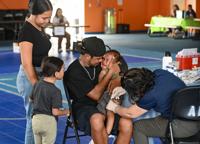Health
Mental Health Crisis Explored at Guam’s Housing Summit

At the recent Guam Homeless Coalition’s 4th Housing and Homelessness Summit, held at the University of Guam, mental health issues and their impact on the community took center stage. The summit highlighted alarming statistics, including that one in five individuals in Guam will experience a mental health crisis, a fact underscored by the over 30,000 crisis interactions recorded since the introduction of the 988 Lifeline in 2022.
Jesse Libby, project coordinator for the 988 Lifeline for Guam, emphasized the critical nature of these findings. “Guam statistically has high rates of suicide, and suicide disproportionately affects people mostly in our community,” he stated. The summit, themed “Navigating homelessness and services amid shifting policy currents,” aimed to address the intersection of mental health services and homelessness, a pressing issue for many island residents.
Mental health crises often overlap with homelessness, with a significant portion of the homeless population utilizing the 988 Lifeline and the Mobile Crisis Response Team (MCRT). Mark Torre Jr., MCRT supervisor, explained that the MCRT provides a more suitable response during mental health emergencies. “Typically, when you’re in a crisis, what number do we call? 911. That’s not wrong, however, there’s now another option, there’s 988,” he noted. This approach aims to reduce reliance on police intervention, allowing trained mental health specialists to handle situations that do not require law enforcement.
Despite the substantial number of calls received, the MCRT has adjusted its operating hours. As of September 1, 2025, the team now operates from 07:00 to 23:30 daily. Torre explained that demand for services peaked during regular working hours, but emphasized that they are prepared to return to 24-hour operations if necessary. Currently, MCRT functions with two to four team members per shift, effectively stabilizing 75% of cases without escalating to police involvement.
The statistics from MCRT reveal that 62% of cases involved mental health crises, with 34% relating to suicidal or homicidal thoughts. Contributing factors include non-compliance with medications, which was noted in 30% of the interventions, while 51% of those stabilized were able to do so within their homes, thus preserving family structures.
Libby also pointed out an ongoing national effort to ensure that calls or texts to the 988 Lifeline are free, which could enhance access for homeless individuals needing support.
Additional gaps in mental health services were identified by Dr. Carla T. Haddock from the Guam Behavioral Health and Wellness Center. She highlighted the absence of dedicated dementia centers on the island, which could provide critical support for individuals with Alzheimer’s or dementia, conditions often mistaken for mental health disorders. “That is really, truly a gap in service on this island,” she remarked.
The summit also discussed legislative efforts to improve mental health care. A recent bill introduced by Sen. Shelly Calvo, known as Bill 219-38, aims to modify and expand the requirements for Assisted Outpatient Treatment. This legislative action is seen as a step toward enhancing the support available for those in crisis.
Alyssa Roberto, project director for Guam Systems of Care, explained their approach to outreach. Lead providers assigned to outpatient consumers meet individuals in familiar locations and assist with transportation needs, utilizing bus passes to facilitate access to services. The Guam Systems of Care operates around the clock with three shifts, ensuring that adequate support is available to those in need.
As Guam continues to confront its mental health crisis, the discussions at the summit reflect a community determined to navigate these challenges, striving to provide better resources and support for its residents. The intersection of mental health and homelessness remains a critical topic, emphasizing the necessity for continued dialogue and action.
-

 Science2 weeks ago
Science2 weeks agoUniversity of Hawaiʻi Joins $25.6M AI Project to Monitor Disasters
-

 Business3 weeks ago
Business3 weeks agoForeign Inflows into Japan Stocks Surge to ¥1.34 Trillion
-

 Top Stories3 weeks ago
Top Stories3 weeks agoMarc Buoniconti’s Legacy: 40 Years Later, Lives Transformed
-

 Top Stories3 weeks ago
Top Stories3 weeks agoBOYNEXTDOOR’s Jaehyun Faces Backlash Amid BTS-TWICE Controversy
-

 Health4 weeks ago
Health4 weeks agoInnovative Surgery Restores Confidence for Breast Cancer Patients
-

 Sports1 month ago
Sports1 month agoSteve Kerr Supports Jonathan Kuminga After Ejection in Preseason Game
-

 Science1 month ago
Science1 month agoChicago’s Viral ‘Rat Hole’ Likely Created by Squirrel, Study Reveals
-

 Lifestyle1 month ago
Lifestyle1 month agoKelsea Ballerini Launches ‘Burn the Baggage’ Candle with Ranger Station
-

 Entertainment1 month ago
Entertainment1 month agoZoe Saldana Advocates for James Cameron’s Avatar Documentary
-

 Top Stories3 weeks ago
Top Stories3 weeks agoCarson Wentz Out for Season After Shoulder Surgery: Urgent Update
-

 Politics1 month ago
Politics1 month agoDallin H. Oaks Assumes Leadership of Latter-day Saints Church
-

 Business1 month ago
Business1 month agoTyler Technologies Set to Reveal Q3 2025 Earnings on October 22









